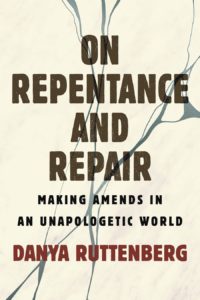It is hard at the moment not to feel that there is no way out — individually, communally, or globally — of the shameful mess that is life. And yet so many of us want to be forgiven: to repair our reputations, to move away from shame, and to restore loving bonds between families and friends.

In her new book, On Repentance and Repair: Making Amends in an Unapologetic World, Rabbi Danya Ruttenberg refuses to throw up her hands. She agrees that there is no way “out” of this mess: “The only way out,” she writes, “is through.”
Ruttenberg confesses that she developed a “soft spot” for 12th-century physician and scholar Moses ben Maimon, better known as Maimonides, whose teachings suggest to her a road map for genuine apology and forgiveness. She writes that Maimonides “offers a powerful, game-changing path to healing and repair.” Those of us — Jews and non-Jews alike — who are open to stepping onto this path can learn to “clean up our own mess” before attempting to reset with what she cheekily refers to as a holy atonement button.
Though it may seem that she has written a self-help book, Ruttenberg is no pop psychologist. She is a serious scholar who writes in ways that are accessible and engaging to all.
Currently, Ruttenberg is a fellow of the National Council of Jewish Women, a politically active national group working to safeguard voting rights, expand access to abortion, and reform the carceral system in the U.S. She routinely unpacks Jewish scripture and commentary in her blog Life Is a Sacred Text. Her posts are always both learned and radically inclusive.
Ruttenberg brings these goals and qualities to bear in her book, which was released this month. She blames a particular version of Christianity for privileging an inner state over external effect and harm. As it developed in Europe after the spread of Protestantism, this kind of Christianity makes forgiveness and salvation possible without insisting that so-called penitents understand their sins or take steps to ensure actual change.
The book jumps from the middle of the 16th century to 19th-century America after the Civil War. (It is perhaps too great a jump.) Ruttenberg’s aim is to document the way Northern politicians and Abolitionist theologians used this misreading of Christian forgiveness to reunite North and South at the expense of Blacks. She jumps again to an insistence that modern-day Democrats forgive supporters of Donald Trump to bring America together once again. (This, too, may be too great a jump.)
Once she’s explained what she sees as the roots of America’s philosophical and political problems, Ruttenberg dives into the substance of the book. In her first chapter, she lays out five steps necessary for effective repentance and repair. She uses the remaining six chapters to explore and illustrate these steps, liberally interpreted from Maimonides’s codification of Jewish scripture, the Mishneh Torah.
First, we must name and own the harm we have caused. If we can’t see or say what we’ve done, we can’t identify what we need to change.
In step two, we begin to change our behavior. When we see that we’re in a situation similar to the one in which we caused harm, we try not to inflict harm again. The desire not to repeat past mistakes isn’t just about making amends to those we’ve harmed. Instead, Ruttenberg writes, it is a desire to move towards transformation: “Without transformation, there’s no repentance. There’s only the same harm, again and again, perpetrated in different ways.”
Restitution and the acceptance of consequences compose the third step. We appreciate that we can’t change the past and can’t undo the harm we’ve caused. We work to find a way to restore and repair, even if our victims won’t forgive us.

Only after we have committed ourselves to the first three steps may we offer apologies. Ruttenberg writes that “a real apology is not aimed at the person who has been hurt, but rather it is given in relationship with them. It requires vulnerability and empathetic listening; it demands a sincere offering of regret and sorrow for one’s actions,” even when the victims are dead.
The fifth and last step is repentance, which Ruttenberg writes is predicated on “understanding that other people’s needs and pain are at least as important — if not more so — than our own.” If our victims refuse our apologies, we are obliged to accept their rebukes “as gifts.” We can’t get defensive, she writes, or else “we miss the chance to work on becoming the kind of person who does not cause pain in the future.”
Ruttenberg draws on examples from history and contemporary life to explain the process of repentance and repair. Her cast of wrongdoers includes clueless coworkers, abusive partners, Twitter trolls, obfuscatory leaders of schools and universities, murderers, Nazis, and segregationists. Victims include intimate partners, Blacks in the Jim Crow South, Blacks in apartheid South Africa, Jews in Germany, Palestinians in the Occupied Territories, Dakotas in Minnesota, and the incarcerated in America.
Ruttenberg’s sources are wide-ranging and interesting. Brené Brown and New York Times columnist Jamelle Bouie carry as much weight as rabbis from throughout history. She paraphrases one of them, Nachman of Breslov, who revived mystical Hasidism in what is now Ukraine in the late 18th century: “If you believe that you can damage, believe that you can fix. If you believe that you can harm, believe that you can heal.”
